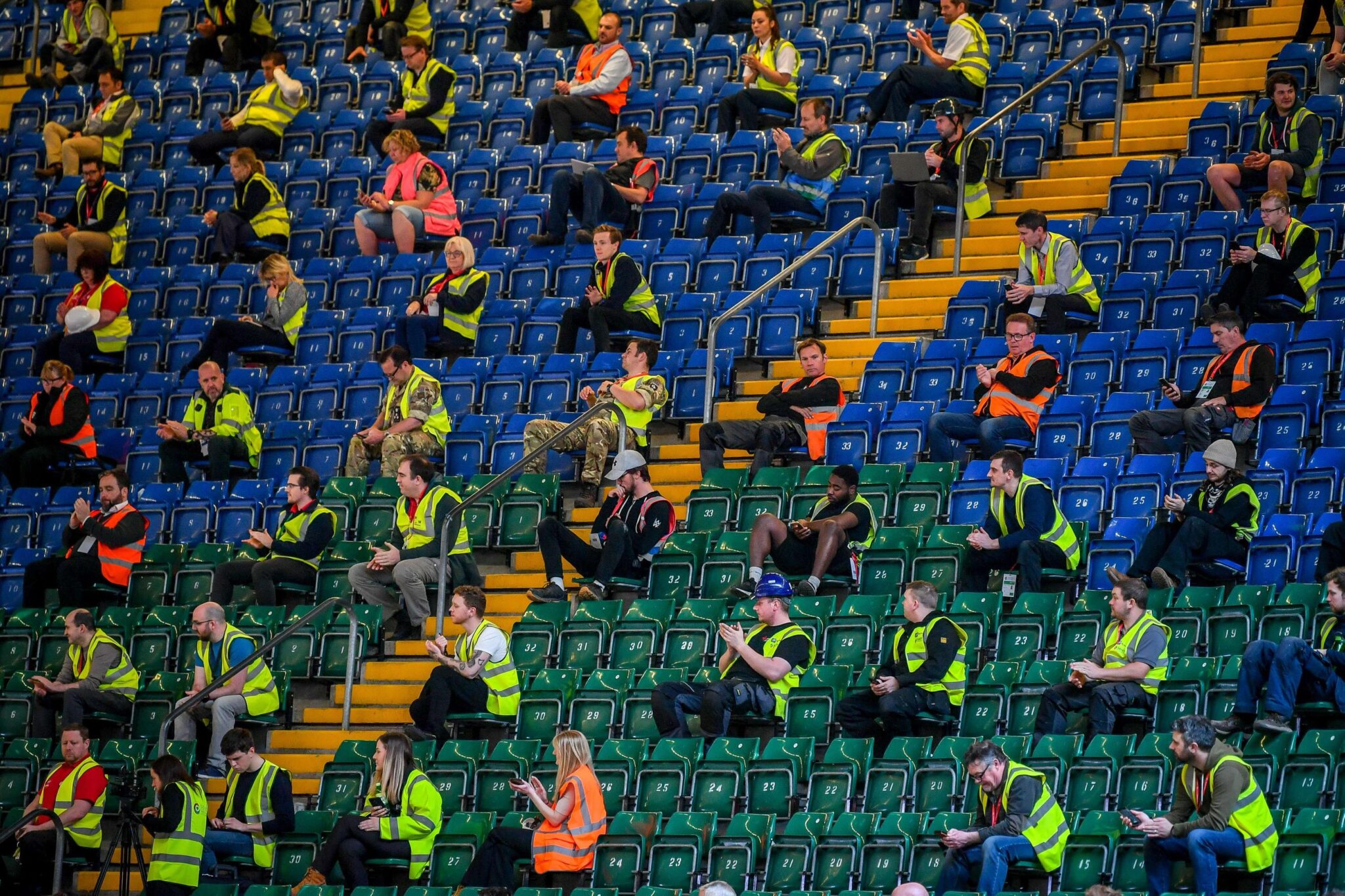One thing is for sure, fans will be watching more sports from home more than ever before. People were asked in an ESPN poll whether they’d rather wait to watch sports with spectators or go ahead and have games be played with no one in the stands. The results showed that 76% were in favor of a return without fans, assuming the health of teams and staff would be closely monitored.

The New Fan Experience in the 1.5-Meter Sports World
Imagine walking into your favorite sports teams’ stadium for the home opener game. It’s the first real event you have been to in almost 6 months. You are excited for the competition, but can immediately sense that the energy is different. Everyone around you is wearing masks and there are plexiglas barriers in between you and security as you walk through a nearly empty gate. You pass by empty concession stands as you follow directional arrows on the ground controlling the flow of fans.
These adjustments fail to faze you because social distancing precautions have become the new normal in daily life. You look out into the wide-open bowl and the stadium seems filled, but you quickly realize that there are cardboard cut-outs separating groups of fans. You think to yourself, is this the new reality of sports?
Welcome to the new world of stadium operations, which, as a professional in this field, is now my new world as well.
Below is a look into what your sporting experience could look like as a result of new social distancing measures.
On-Site Fan Experience
Entry
The day before your event, you will receive your assigned entry time to avoid the rush at gates and overwhelmed security checks and temperature scans. VIPs and suite ticket holders will have separate entrances and designated routes to their suite.
Crowded elevators, escalators, and stairwells are a thing of the past. Each will have measures in place to limit the number of people who can pass through at a single time.
Mobile Application
As soon as you arrive in the stadium parking lot, you will receive a notification prompting you to scan your ticket and showing you the least crowded gate entrances. A mobile app on your smart phone will use geofencing, a location-based technology, to send you updates that are personalized to your fan experience.
If you’re tired of missing the action because of long concession lines during half-time, now you can order food and beverages via mobile app and have them delivered to your seat. The app will also be able to tell you which restrooms have the shortest lines and which concessions are closest to you for pick-up or delivery.
To fill the fan experience gap, you will have the capability to scan tickets, win giveaways and receive marketing promotions via mobile apps. Teams will be able to engage fans differently than ever before. Having a bad view of the pitch will no longer be a problem. Instant replays and livestreams will allow fans to get a virtual view of the field mid-match, as well as, real-time stats.
Suite amenities will become digital and touchless. Once you arrive at the stadium, your suite attendants will be notified to begin the preparation of food in your suite. You will now be able to order beverages via smart phone and they will be delivered by on-call suite attendants to reduce the amount of outside contact.
Capacity
No more bumping elbows with the loud obnoxious fan beside you or having a pint of beer spilt on you when your team scores. Seating capacity will drop to between 50% and 70% capacity and seats will be sectioned off by groups of 4 to 8 people, similar to the original Major League Baseball ‘loge box’ seating. The distance between fans will have to be at least 4 seats on each side and 2 rows in front and behind.
Stadiums could take out seats to enforce the social distancing and add railings in between rows to create the seating separations. In the future, stadiums might max out at 80% of their original capacity.
One major result of this is that home field advantage will be less impactful. Without full stands, playing at home will have a significantly lower effect on a team’s performance and the overall outcome of a tournament.
Sanitation
As venues ramp up sanitation, establishing stricter set guidelines for cleaning protocols, practices, and procedures will be necessary to give fans peace of mind when returning to their venues.
Masks will become part of your fan gear branded with your teams’ logo. While they might only be required during sporting events for the next six to twelve months, they could become a permanent trend, especially if they provide you with one more way to rep your team.
Concessions will be prepackaged and touch-less transactions through mobile apps will help to prevent contamination. Suites will have clear barriers from other suites, including outdoor seating areas, and larger suites will be divided into smaller suites to accommodate social distancing guidelines.
Spectators will see sanitation stations set up throughout stadiums that look similar to condiment stations and teams could even hand out branded mini hand sanitizer bottles. There will be disinfecting wipes available every couple of rows for fans to grab before they head to their seats.
Ceremonies & Traditions
Some of your favorite football traditions could be changed forever. The traditional team procession onto the field, which consisted of players holding hands with young player mascots sporting team jerseys, will look different or be eliminated completely. Coin tosses and congratulatory handshakes will be traded for elbow bumps or cleat taps. Ceremonies for larger tournaments could transition over to digital to minimize the person-to-person interactions. Trophy presentations could become less elaborate with minimal staff interacting with the players.
Exit Strategy
Once the final whistle blows, fans will be directed to stay in their seats until their specific sections are permitted to exit the building row by row. No longer will there be a stampede of people rushing to their cars and trains at the end of every event. You will exit the stadium much like you board a plane: a few zones at a time.
At-Home Fan Experience
Broadcast & Streaming
All around the world, TV network partners and leagues are discussing mutually beneficial plans to fulfill the remainder of their broadcast commitments for the year. Premium paid streaming services for live European football might be available sooner than expected for first-team games. The Premier League had already planned to begin streaming in 2022 and UEFA discussed expanding their streaming platform, UEFA.tv, to supplement live broadcasts of Champions League, Europa League and Nations League. The desire for on-demand sports will skyrocket when more leagues resume and streaming platforms could be used as an alternative revenue stream to make up for lost ticket sales.
“Stay-At-Home” App Experience
Leagues will be forced to get creative with ways to engage their supporters while fans are not permitted in stadiums. Mobile apps will temporarily be one of the main forms of fan engagement, but they could become a permanent way of enjoying sports even when fans are allowed back in venues. There is no doubt that some fans may choose not to attend games in person for the foreseeable future, so why not bring the fan experience to them?
Mobile applications will give you live behind-the-scenes access, which could include the ability to engage with live commentators and enter to win personalized messages from players. These unique moments create shareable content that stands out. We could also see Virtual Reality become part of your at-home, cinematic set-up so you can feel like you are at the live event.
Multiple unique approaches have been presented across the industry in many different sports. There is an old saying that “Necessity is the mother of invention”. It will be interesting to see how something like a pandemic will catapult us into a completely new world of fan experience for all sports across the globe.
Loyal fans are dying for their teams to come back, but now their fan experience is going to look quite different. Although these adjustments may require expensive stadium renovations, procedures and innovations, the future of sports relies on the industry’s flexibility and commitment if we expect to see our favorite teams compete in person any time soon.
Original article 09.06.20 on Linked In.
Morgan Colley is an event specialist with a background in international football operations. She spent the last few years as the Operations Manager for the International Champions Cup, a preseason tournament for top-tier European Club Teams, such as, Real Madrid and Manchester United. She has also operated Women’s Tournaments, Youth Tournaments, and National Team Matches
To view the original article click here
© The Fan Experience Company 2020
